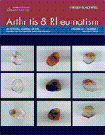Rapid and sustained improvement in bone and cartilage turnover markers with the anti–interleukin-6 receptor inhibitor tocilizumab plus methotrexate in rheumatoid arthritis patients with an inadequate response to methotrexate: Results from a substudy of the multicenter double-blind, placebo-controlled trial of tocilizumab in inadequate responders to methotrexate alone†
ClinicalTrials.gov identifier: NCT00106548. EudraCT database no. 2004/00374/40.
Abstract
Objective
To investigate the effects of tocilizumab (TCZ) added to a stable dosage of methotrexate (MTX) on biochemical markers of bone and cartilage metabolism in patients in the multicenter double-blind, placebo-controlled OPTION (Tocilizumab Pivotal Trial in Methotrexate Inadequate Responders) study who have moderate-to-severe rheumatoid arthritis (RA) and an inadequate response to MTX.
Methods
Included in this study were 416 of the 623 patients with active RA enrolled in the OPTION study. Patients were randomized to receive TCZ (4 mg/kg or 8 mg/kg) or placebo intravenously every 4 weeks, with MTX continued at the stable prestudy doses (10–25 mg for 20 weeks, with a final followup at week 24). Serum biochemical markers of bone formation (osteocalcin, N-terminal propeptide of type I collagen [PINP]), bone resorption (C-terminal crosslinking telopeptide of type I collagen [CTX-I] and C-terminal crosslinking telopeptide of type I collagen generated by matrix metalloproteinases [ICTP]), cartilage metabolism (N-terminal propeptide of type IIA collagen [PIIANP]), collagen helical peptide [HELIX-II]), and matrix metalloproteinase 3 (MMP-3) were measured at baseline and at weeks 4, 16, and 24.
Results
TCZ induced marked dose-dependent reductions in PIIANP, HELIX-II, and MMP-3 levels at week 4 that were maintained until week 24, an effect associated with increased levels of bone formation markers that were significant as compared with placebo only for PINP and only at 4 weeks (P < 0.01 for both TCZ doses). TCZ induced significant decreases in the bone degradation markers CTX-I and ICTP, providing initial evidence of a beneficial effect on bone turnover. TCZ-treated patients who met the American College of Rheumatology 50% improvement criteria (achieved an ACR50 response) or achieved clinical remission (as determined by a Disease Activity Score in 28 joints <2.6) at week 24 had greater reductions in ICTP, HELIX-II, and MMP-3 levels as compared with ACR50 nonresponders.
Conclusion
TCZ combined with MTX reduces systemic bone resorption, cartilage turnover, and proteolytic enzyme MMP-3 levels, which provides evidence of a limitation of joint damage and possible beneficial effects on skeletal structure in patients with established moderate-to-severe RA.




